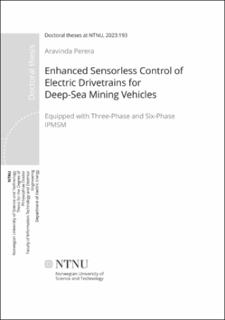| dc.description.abstract | The thesis deals with sensorless control methods for three-phase and six-phase Interior PermanentMagnet SynchronousMachine (IPMSM) drives, targeted for deep-sea mining vehicles (DMVs).
Rapid growth in the demand for earth minerals, and the increasing limitations on their supply, has driven the search for new mineral sources, among which deep-sea appears to be promising. However, among other challenges, the lack of sustainable technology for environmentally friendly and cost-effective mineral harvesting has deterred explorations in deeper waters. Thus, the need to bridge this technology gap has become the motivation behind this doctoral research.
Electric drivetrains have become the centerpiece of modern deep-sea mining vehicles, which are developed with the aim of reaching water depths beyond three kilometers. Reliability, efficiency, and power density have been identified as the features of merit regarding these electric drives. From this perspective, mechanical sensorless, multiphase IPMSMdrives have emerged as a strong contender owing to the elimination of failure-prone sensors, their inherent fault-tolerance, higher efficiency and superior power-to-volume ratio, among other appealing features.
Online identification of machine parameters can enhance the drive performance and stability and supplement it with additional features like sensorless temperature, health, and condition monitoring. A method that employs an open-loop current predictor is proposed herein, which yields a prediction error that is sensitive to model parametric discrepancies. Analytical expressions for the steady-state prediction error are developed, which provides insights into the interplay between the mechanical states, stator currents, and parameters. These expressions become instrumental in online and offline experiment designs for parameter identification. The prediction errors are further utilized to develop prediction gradients w.r.t. model parameters that allow the adoption of gradients-based recursive algorithms. The thesis subsequently presents the application of three such algorithms to identify all electric parameters of IPMSM, including the stator leakage inductance in six-phase IPMSM. Additionally, offline experiment methods are proposed to identify machine inductances, which then are compared against the inductances obtained from the finite element model. The predictor model stability is analyzed both in continuous and discrete domains. As an alternative option to the processor-based solution, the predictor model is implemented in the FPGA to assess its performance with shorter integration time steps.
From the parameter identification, the research proceeds to incorporate these identification schemes into state estimation. The reliance on model parameters makes the performance of the model-based state observers vulnerable to parametric deviations. The proposed online parameter estimator, a more sensitive scheme for parametric deviations, functions in parallel to provide the observer with the real-time updated model parameters. To circumvent the rank-deficiency challenge without compromising the performance, the IPMSM inductances are identified offline using the same open-loop model and used in real-time with the aid of either a look-up table or analytical functions. This thesis shows that, by incorporating the proposed schemes, model-based observers can be made more stable, precise, and robust to parameter variations as compared to those observers without parameter adaptation.
All concepts are tested and validated for both three-phase and six-phase IPMSM drives, with the use of Matlab/Simulink simulation environments as well as the FPGAbased real-time simulation. The latter is developed, as part of the research, using a Xilinx Zynq System-on-Chip-based industrial control platform. The same control hardware and software are later applied to the newly developed laboratory prototypes for validation. The experimental results demonstrate the effectiveness of the proposed online and offline identification schemes. The open-loop model along with the prediction gradients-premised algorithms succeed in tracking temperature-sensitive parameters within a few seconds while showing good asymptotic stability. The experimental results further exhibit how rotor speeds as low as 1% can be reached by incorporating the proposed identification schemes. In the same low-speed region, the steady-state average rotor position error was reported below two electrical degrees, for both three-phase and six-phase IPMSM drives. The feasibility of realizing sensorless control at very low speeds without test signal injection can make the proposed schemes attractive for a variety of deep-sea mining-associated and similar reliability-critical applications that do not require persistent operations around the rotor standstill. | en_US |
